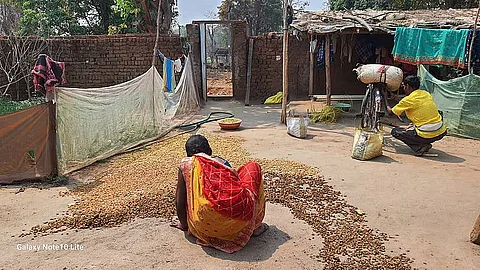

A light, sweet fragrance of mahua flowers fills the air as one enters Guleshwar Dhruv’s home. In his spacious courtyard, around 40 kilogrammes of mahua flowers are laid out to dry — collected over three days of painstaking effort.
Guleshwar Dhruv lives with his wife and three children in Chhattisgarh's Boir village which is situated in the Gariaband district. His village, which 800 people, has over 200 mahua trees — a vital source of livelihood for hundreds of villagers like him, especially in March and April.
Guleshwar gathers freshly fallen mahua blossoms from the trees and uses his bicycle to carry sacks of the forest produce.
Guleshwar owns seven mahua trees, which bloom the flowers near his farmland bordering the forest. He considers the flowers that drop onto his fields a blessing.
Every year, he collects 200-300 kilograms of mahua, earning Rs. 10,000–12,000 — money spent on household expenses, his children’s education and clothing. He doesn’t need to travel far to sell the flowers; traders come directly to his home to buy them.
After the mahua flowering season concludes by June–July, the fruit season begins.
Each year, Guleshwar gathers five to 10 kilogrammes of seeds from the fruit, which are pressed to extract oil. Ten kilograms of seeds yield roughly 2–3 kilograms of oil. He explained that while villagers once used mahua oil for cooking, its consumption has dwindled. However, it remains a traditional remedy for coughs, colds and fevers.
In Patharri village, Fingeshwari Dhruv collects mahua with her four-year-old daughter. She hails the flowers as her "ATM" — a financial lifeline in emergencies.
She sells dried mahua only when prices are favourable, usually after the season ends, when traders offer the best rates. By May–June, prices rise to Rs. 50–55 per kilogram, making it the most profitable time to sell.
Guleshwar noted that the entire region becomes engrossed in mahua collection during the season. Social events, even weddings and village meetings, are often postponed — nothing takes priority over mahua. Even visits to relatives are avoided, as tribal families focus entirely on harvesting this precious resource.